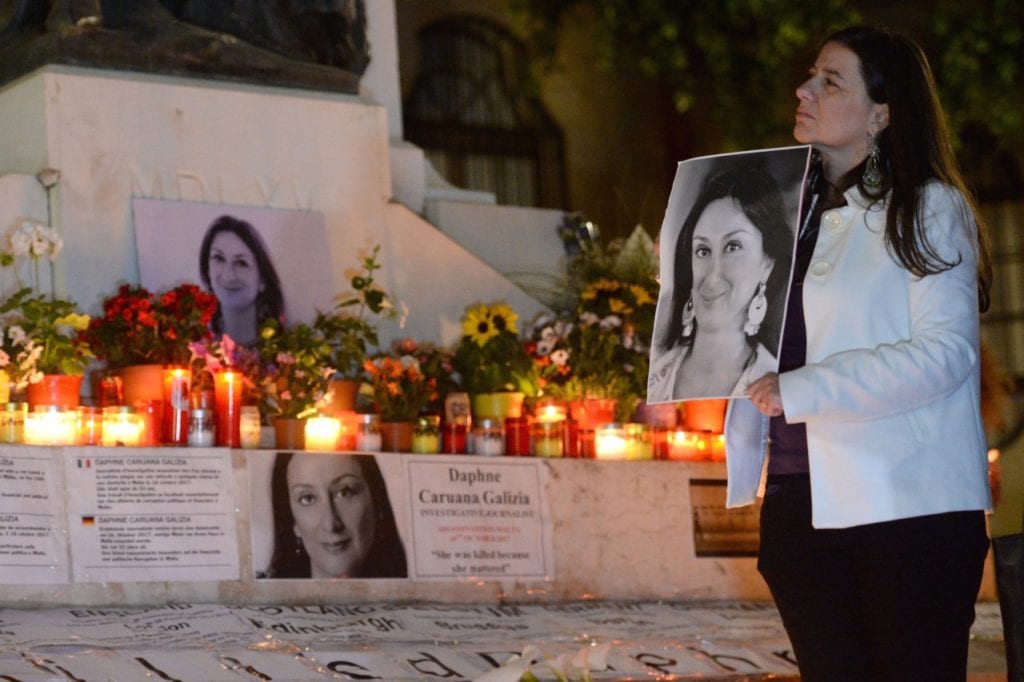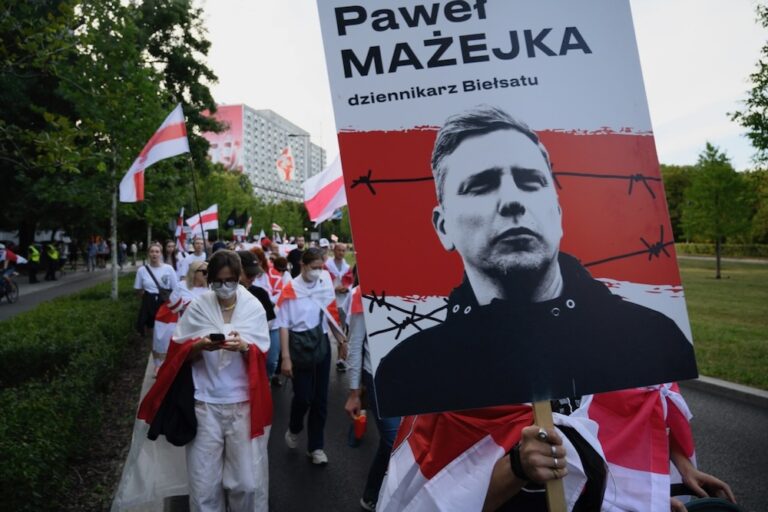May in Europe and Central Asia: A roundup of key free expression news, based on IFEX member reports.
Daphne Caruana Galizia and rule of law
There was welcome news on 29 May, when the Committee on Legal Affairs and Human Rights of the Parliamentary Assembly of the Council of Europe (PACE) approved, without amendment, Special Rapporteur Pieter Omtzigt’s report on the murder of journalist Daphne Caruana Galizia and the rule of law in Malta. Omtzigt’s report is damning, tying weaknesses in the criminal justice system to the ongoing failure to punish Daphne’s killers. It points out that the three men currently in custody and charged with the murder will have to be released soon if they are not put on trial within the next two months, and that the commissioners of the crime have still not been arrested. The report calls for an independent, public inquiry into Daphne’s murder.
Ahead of a meeting of the Legal Affairs and Human Rights Committee, the European Centre for Press and Media Freedom and IFEX members sent an open letter to Maltese members of PACE, urging them to support Omtzigt’s mandate and report, and asking them “to constructively promote implementation of its recommendations without delay”.
Four brutal attacks
May saw at least four brutal attacks on journalists in Turkey. On 24 May, an unidentified gunman shot Hakan Denizli, founder of Egemen newspaper, in the leg in the city of Adana; on 20 May, Ergin Çevik, chief editor of the news website Güney Haberci, was attacked in the street by three unidentified assailants in Antalya; on 15 May, investigative journalist İdris Özyol was hospitalised after an assault outside Yeni Yüzyıl newspaper’s building in Antalya; and on 10 May, journalist and critic of the government Yavuz Selim Demirağ was attacked in front of his home by a gang wielding baseball bats. Six men were detained following the attack on Demirağ, but were later released. There have been no reported arrests in connection with the other incidents.
IFEX member and International Press Institute (IPI) executive board member Kadri Gürsel was briefly jailed on 28 May, after reporting to the authorities to serve out the remainder of a two-and-a-half year jail sentence he had received in 2018 following his conviction on trumped up terrorism-related charges. He was released on probation.
A safety app for activists
Journalist Vadym Komarov was beaten into a coma in the early hours of 4 May in Cherkasy City, Ukraine. Komarov, who reports on local corruption, is still unconscious. The police are treating the attack as premeditated attempted murder, but no-one has yet been arrested. Komarov has been attacked on at least two previous occasions.
IFEX regional member, the Institute of Mass Information (IMI), reported in May that a new online application would be launched with the aim of enhancing activists’ safety. Human rights law experts will work with tech organisations to develop the application, which will provide a ‘hot button’ to be used to alert emergency services when an activist is in immediate danger, a chat-bot which will provide advice on how to stay safe, and guidance on digital and physical security (including basic First Aid). This could prove to be a very useful tool; in November 2018, activist Kateryna Gandziuk died due to horrific injuries sustained in an acid attack months earlier.
On 20 May, Volodymyr Zelenskiy, the new president, took office. Human Rights Watch (HRW) urged him to “address several key human rights concerns as a central part of his administration’s agenda”. Among these concerns are attacks on civil society activists and journalists, and inadequate accountability by law enforcement and security service agencies.
Arrested for holding a blank placard
With a snap presidential election set for 9 June, public protests are taking place in Kazakhstan about its poor civil liberties record and over fears that the election (the first since 1991), will not be fair. The Kazakh authorities have been cracking down on signs of dissent. During protests in early May, a wide range of news websites and social media platforms were blocked; activists were also detained at demonstrations or prevented from leaving their homes.
To highlight the Kazakh authorities’ ludicrously low tolerance of dissent, activist Aslan Sagutdinov decided to hold a blank placard and stand opposite the central council offices in the city of Oral in early May. As expected, he was arrested within minutes, although police later released him because they could not decide what to charge him with. Sagutdinov’s stunt went viral.
Crackdown ahead of European Games
The European Games are set to begin in Belarus in late June, and the authorities are already cracking down on attempts by activists to use the opportunity to draw attention to Belarus’s dismal human rights record. The Belarusian Association of Journalists (BAJ) reports that President Lukashenka has signed an edict giving police the power to shut down websites within 24 hours if they are considered to have called for “unauthorised protests”. Ahead of the Games, HRW called on the European Olympic Committees (EOC) to ensure that all journalists covering the event can operate free from harassment. According to HRW, the EOC’s leadership confirmed that it “had appointed a ‘contact person to monitor’ the rights of journalists during the games”. HRW has called on the EOC to make sure that information regarding this contact person be made readily available to all journalists ahead of the Games. During the last two years, Belarusian authorities have filed a record number of criminal complaints against journalists and bloggers.
Gender focus
Over the last two years, Chechnya’s anti-LGBTQI+ purges – in which gay people have been jailed, tortured and raped by law enforcement officers – have made global headlines. However, the voices of female victims have been largely absent from the reporting. A recent article on Open Democracy explores why this is the case, citing Chechnya’s very conservative state, religious and customary laws (which apply another layer of pressure on women to stay quiet), fear of families’ reactions, and possible retribution by the police. Because of the pressures on them to remain silent victims, “Chechen women [are] the most vulnerable group in the region’s anti-LGBTQI+ purges”.
On 10 May, a Pride march by students at the Middle East Technical University in Turkey, Ankara was brutally dispersed by police who used tear gas, pepper spray and plastic bullets against the marchers. Twenty five students were reportedly arrested. This violent act of repression came just weeks after Ankara lifted a ban on LGBTQI+ events that it had issued during Turkey’s state of emergency.
However, it now appears that there were two separate bans on LGBTQI+ events in Ankara: one imposed during the state of emergency and another one issued after the state of emergency ended in October 2018 (this latter one has apparently not been lifted). Bianet clarifies the details.
After reading the previous paragraphs, it will not come as a surprise that Russia and Turkey are among the four lowest-ranked countries in Europe in terms of LGBTQI+ rights (the other two are Armenia and Azerbaijan). Their rankings are based on a study carried out by ILGA-Europe. The four most gay-friendly countries are Malta, Belgium, Luxembourg and Finland.
In brief
IFEX members the Committee to Protect Journalists (CPJ), the European Federation of Journalists, (EFJ) HRW, the International Federation of Journalists (IFJ) and Reporters Without Borders (RSF) rang the alarm bells this month over an apparent attempt by the authorities in France to intimidate journalists working on “sensitive” stories that are potentially embarrassing to the government. Eight journalists were summoned for questioning by the French domestic intelligence agency, the General Directorate for Internal Security (DGSI) in May. The journalists had been investigating French arms sales to Saudi Arabia and the apparent cover-up of alleged offences by former security aide to President Macron, Alexandre Benalla.
There was very good news from Uzbekistan in May, when it was announced that numerous news and NGO websites – previously blocked – would be unblocked (many have been unavailable in Uzbekistan since 2005). There has been a slow but welcome movement towards allowing freer expression in the press and online since the death of President Islam Karimov in 2016.
In early May, police arrested four men in connection with the killing of journalist Lyra McKee during riots that took place in Northern Ireland in April. The New IRA said its members were responsible for the killing, but implied that she had not been the intended target.
RSF announced it would launch an All Party Parliamentary Group (APPG) on Press Freedom in the UK. The group will focus on promoting and defending press freedom both in the UK and globally.
Human rights journalist Azimjon Askarov is Kyrgyzstan’s most famous political prisoner. An ethnic Uzbek who exposed corruption in the mainly ethnic Kyrgyz police force, he was jailed for life in 2010 after being dubiously convicted of complicity in the murder of a police officer during inter-ethnic riots. In May, his wife Khadicha said that the authorities were threatening to take away her home if she did not pay her husband’s accusers (including the deceased police officer’s wife) $2,550 in moral damages. As a pensioner Khadicha receives $58 per month. The authorities tried and failed to seize the family home in 2012.
In Greece, journalist Mina Karamitrou was targeted with a car bomb outside her home on 14 May. Karamitrou, a police reporter for CNN’s Greek edition, was not injured in the attack, which she believes was related to her coverage of Dimitris Koufodinas (currently serving 11 life sentences for murders committed while he was affiliated with the November 17 anarchist group).
If you enjoyed this, check out all the May regional roundups!



